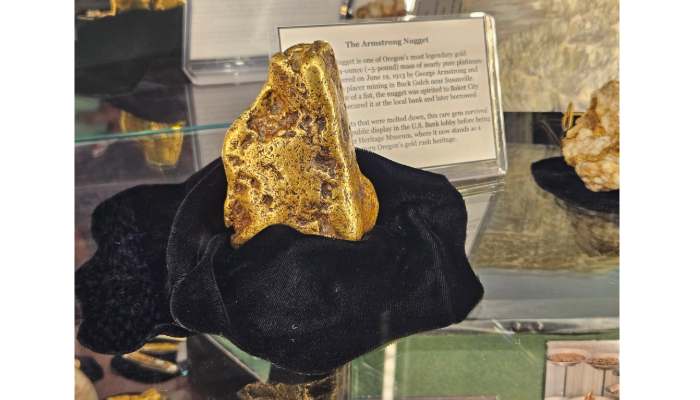The Edward Morris Confession, Part 3 of 3
Published 12:00 am Friday, December 31, 2004

- Edward Morris and his wife, Renee, their sons, Bryant and Jonathan, and their daughter, Alexis. After his capture, Morris confessed to killing his family on a logging road near Tillamook. (Photo courtesy Tillamook Headlight-Herald).
By JAYSON JACOBY
Trending
Of the Baker City Herald
Edward Morris pulled the family’s gray Dodge minivan onto a logging road that meets Ore. Highway 6, a curvy route that connects the Willamette Valley and Tillamook.
It was about half an hour before midnight, Thursday, Dec. 19, 2002. Morris’ pregnant wife, Renee, sat in the passenger seat. Their children, Bryant, 10, Alexis, 8, and Jonathan, 4, were asleep in the minivan’s rear seats.
Trending
Morris had told his family earlier in the day that he had rented a house on the Oregon Coast for the night.
As he brought the van to a halt, Morris told Renee to close her eyes because he had a surprise for her.
At this point on the audio cassette tape that captured his confession on Jan. 4, 2003, Morris begins to sob softly.
A few hours later a defense attorney would persuade Morris to stop talking to police.
But in the hours after his arrest that day in Baker City, Morris told Sgt. Randy Crutcher in detail about how murdered Renee, Bryant, Alexis and Jonathan.
A recorder preserved the confession on tape, a tape that helped Tillamook County District Attorney William Porter secure a guilty plea from Morris in September 2004. In November 2004 a judge sentenced Morris to prison for the rest of his life, without the possibility of parole.
Morris’ voice breaks occasionally as he tells Crutcher his story.
He walked to the rear of the minivan, opened the hatch, reached inside and retrieved one of the .22-caliber pistols he had bought two days earlier at a Portland gun shop.
Morris tucked the pistol into his waistband. In one hand he held a pellet gun.
Morris tells Crutcher that at that instant he considered getting back in the van and driving home.
But then, after making a sound that’s part weep, part laugh, Morris points out in a self-deprecating way how ridiculous it would have been to explain to his wife that he had intended to kill her but then changed his mind.
andquot;I was chickening out but I didn’t give myself any back door,andquot; Morris says. andquot;I loved (Renee) so much I didn’t want her to think I was a horrible person.andquot;
Morris walked to the van’s passenger side door. He told Renee to keep her eyes closed.
He aimed the pellet gun at her closed eye, then pulled the trigger.
Morris says Renee cried out in pain, asked him what he was doing.
As he continues the story he begins to cry, and his words, which had been as clearly enunciated as the narrator’s on an audio book, become harder to understand.
andquot;For some reason I thought (Renee) would just die,andquot; Morris said. andquot;But she didn’t. It wasn’t like in the movies.andquot;
He says he shot Renee with the pellet gun because he had not had time to make a silencer for the pistols, and he was afraid someone would hear gunshots.
He thought the pellet would kill his wife as efficiently as a bullet would have.
He was, he admits on the tape, andquot;ignorant about guns.andquot;
andquot;I was such an idiot,andquot; he says to Crutcher.
Morris says he then shot Renee with the .22 pistol.
(According to autopsy reports, doctors removed four bullets and two pellets from Renee Morris’ body.)
But that wound wasn’t fatal, either.
The shot did, however, awaken his sons.
Morris says he shot both boys with the .22.
He then drove a short distance along the logging road.
Morris says Renee stayed alive for about 45 minutes after he shot her, although she was unconscious at times.
When she was awake, Morris says, Renee told him that she loved him, that Jesus loved him, and that they both forgave him for what he had done.
Morris says he was afraid to fire the .22 again. He stabbed Renee in the lungs.
He also stabbed his daughter, andquot;about five or 10 times.andquot;
(According to an autopsy report, Alexis Morris was stabbed at least 18 times.)
Morris had trouble moving his wife’s body out of the minivan. He tells Crutcher that he cut Renee’s legs, hoping to drain the blood and reduce the weight.
He hauled Renee’s, Bryant’s and Jonathan’s bodies to one side of the logging road, and Alexis’ to the other side.
Then he drove back to Portland.
Morris went first to his home. He retrieved the andquot;blonde rock star wigandquot; and other elements of a disguise he had bought the day before.
Morris then drove east on Interstate 84. He had about $3,000 in cash.
He says he nearly fell asleep near The Dalles, so he exited there and pulled into a motel late on the morning of Dec. 20, 2002.
Morris says he did not want to show his driver’s license or otherwise reveal his name to the motel clerk because he was afraid police would be tracking him.
He invented a andquot;cover storyandquot; in which he said he lived in Anchorage, Alaska, and had lost his driver’s license when he was mugged in Albuquerque, N.M.
Morris slept several hours, then continued driving east on Interstate 84.
He tells Crutcher that he drove almost constantly for much of the next day, passing Baker City and following Interstates 84 and 80 southeast through Idaho into Utah, then Interstate 15 south to Las Vegas.
Morris says he thought he had enough cash to start his new life as a man who killed people for their money.
andquot;I’m a very frugal person,andquot; he tells Crutcher.
Morris planned to dress andquot;like a businessmanandquot; so he would not seem suspicious, and to buy a farm where he could bury the bodies of his victims.
Morris tells Crutcher he believed that andquot;on a successful dayandquot; of murder he could make as much as $3,000.
Crutcher, Baker City Police Det. Kirk McCormick and Baker County Undersheriff Ken Draze give Morris a felt pen and an atlas so he can outline his travels.
andquot;I’m going to cost the state thousands of dollars, what’s a couple of bucks for a map,andquot; Morris says.
He can’t remember the name of a certain town near Las Vegas that he visited, only that it starts with a andquot;P.andquot;
McCormick, who once lived in Southern California, suggests andquot;Pahrump,andquot; which is near the California border about 40 miles west of Vegas.
andquot;Pahrump!andquot; Morris exclaims, like a man who finally remembers the name of the song that has been playing in his head all day. andquot;That’s it!andquot;
His first plan was to buy a train ticket from Seattle to Las Vegas, then drive to Seattle and leave his minivan in the long-term parking lot at Seattle-Tacoma Airport.
Morris says he wanted police to find his minivan and assume that whoever killed his wife and children murdered him as well, then took a flight from Sea-Tac.
andquot;Then I can go on my killing spree,andquot; he tells Crutcher.
But Morris says he learned that Amtrak doesn’t stop in Las Vegas.
He then describes several other schemes, including finding a gray minivan similar to his and swapping license plates.
andquot;I couldn’t do it,andquot; Morris tells Crutcher.
Morris says he didn’t at that time worry about returning to Oregon because he didn’t think police had found the bodies.
He says that none of his friends expected the family to return from the Coast until Dec. 20, for the dress rehearsal of a Christmas play at the family’s church.
andquot;I probably ruined that play,andquot; Morris says. andquot;My wife was co-director and my kids were the stars my two oldest kids.andquot;
Morris then tells Crutcher that he decided to build a andquot;dirt houseandquot; in the desert, live in it, and andquot;do most of my killing in the winter.andquot;
Killing in a warmer season would be problematic, Morris says, because it would be hard to conceal a weapon while wearing shorts.
andquot;Remember, I’ve wanted to be a murderer since I was a kid,andquot; he says.
Morris says that before he left Nevada for Arizona, he came across a man sleeping in a Ford Explorer parked along a gravel road a couple hundred feet from a highway near Pahrump.
Morris tells Crutcher that he considered robbing, and possibly killing, the man, but decided not to.
Once inside Arizona Morris drove to Flagstaff.
andquot;We went to Flagstaff,andquot; he says on the tape, then chuckles. andquot;We. I’m getting to like you too much, Randy,andquot; he tells Crutcher. andquot;I’m starting to include you in my trip.andquot;
Near Camp Verde, between Flagstaff and Phoenix, Morris says he stopped at a church. He told the pastor his real name, and said he was writing a book and looking for a secluded property to rent.
Morris says the pastor let him sleep in the church’s fellowship hall.
andquot;He was a nice guy,andquot; Morris says. andquot;I hate that I lied to him.andquot;
Morris arrives in Phoenix on, he thinks, Dec. 23. He finds a Sears store and there buys a welder and a drill press tools he needs to build a silencer for his gun.
His memory is exact Morris recalls that he wanted the 12-inch drill press, decided he couldn’t afford the $194 price, so he bought the 8-inch press for $94.
But then he worried that the smaller press wouldn’t be sufficient to construct a usable silencer.
He tells Crutcher that he wished the homemade device would explode and kill him.
andquot;I would be OK with that,andquot; Morris says. andquot;It’s what I deserved.andquot;
He then embarks on another of the narrative asides that interrupt the otherwise chronological order of his story.
He tells Crutcher that he spent hours trying to clean his wife’s blood from between the minivan’s front seats.
andquot;I did such a bad job of killing her, and she bled a lot,andquot; Morris says.
He says he eventually gave up, although he claims the pre-moistened cloths he had in the van, the sort of thing you use to wipe a baby’s bottom during a diaper change, were quite effective in cleaning blood spatters.
andquot;They’re wonderful for things of that nature,andquot; Morris says.
He tells Crutcher he spent the next week or so either in Phoenix or in the desert west of the city.
He bought a power inverter but it wouldn’t run his welder, so he never made much progress on the silencer.
(Police found the silencer-in-progress, with a single hole drilled, when they searched Morris’ van.)
Morris says he met a man who told him about an abandoned building as large as an airplane hangar. Morris burned andquot;probably 150 dollars worth of gasandquot; looking for, but never finding, the hangar.
andquot;Imagine how many bodies and cars you could store in a hangar,andquot; he says.
Morris slept in his van. To ward off the chilly desert air at night he lit three candles. But even so he had to start the van’s engine every two hours and run the heater.
Later Morris says he bought two more candles, for a total of five. andquot;That was good for four hoursandquot; without running the van’s heater, he says.
On the night of Jan. 1, 2003, Morris says he drove to Phoenix to start his murderous new career.
andquot;I intended to kill that night,andquot; he tells Crutcher.
Morris says he met a man named Sean who, apparently still tipsy from a New Year’s party, had driven his car off the road.
He says he thought about killing Sean but instead drove the man to his home.
Morris then drove around a rather seedy neighborhood in North Phoenix, the sort of place where bars and tattoo parlors greatly outnumber, say, churches.
And the place was poorly lit, Morris says.
andquot;Just the sort of target area I was looking for,andquot; he says.
Morris tells Crutcher that he figured he could kill a couple of people, without even robbing them, and that killing would become andquot;easier and easierandquot; after that.
andquot;But I couldn’t even get out of the car,andquot; he says.
andquot;I’m already realizing, ‘oh, no, there’s no hope for me,’ andquot; he tells Crutcher.
Morris says he decided the next day, Jan. 2, that he could not kill anyone else. He also decided he would drive back to Oregon and andquot;turn himself in.andquot;
But first Morris wanted to see the Grand Canyon.
andquot;God gave me a beautiful family and I destroyed it,andquot; he tells Crutcher. andquot;I wanted to see something beautiful that I couldn’t ruin.andquot;
And then, as he had while he described the murders, Morris cries.
He hiked for a couple miles along the canyon’s rim, watching the sun climb into the sky.
andquot;It was pretty, but I really needed to have my wife there,andquot; Morris says. andquot;Renee and I had always wanted to go (to the Grand Canyon). I kept seeing all these beautiful families.andquot;
From the Grand Canyon Morris says he drove west to Utah, then north, retracing his route along Interstates 15, 80 and 84 into Idaho.
At this point on the tape, about 4:45 p.m., Crutcher tells Morris that the investigators had arrived from Tillamook.
andquot;Wow, that was a fast drive,andquot; Morris says.
andquot;They flew,andquot; Crutcher tells him.
Morris says he can finish his story in just a couple minutes.
He stopped in Boise that very morning, Jan. 4, 2003, intending to buy gas and 100 feet of rope. He tells Crutcher he planned to use the rope to haul his wife’s body to the van.
Morris says he also intended to recover his children’s bodies, and have them in the van when he turned himself in to police.
But the Boise store had only 50-foot lengths of rope, Morris says.
And that’s why he exited the freeway at Baker City.
He hoped the Rite Aid store stocked 100-foot ropes.
It didn’t, and Morris never had a chance to check another store, thanks to two alert motorists who saw his minivan driving on Interstate 84 east of Baker City.
Two Baker City police officers arrested Morris as he exited the Rite Aid.
As Morris concludes his story, Crutcher speaks.
andquot;I can’t tell you, Edward, how much I appreciate your candor,andquot; he says.
Then Crutcher asks Morris if any of the police officials made him any promises to persuade him to talk to them.
andquot;Just that I could finish my sandwich and use the bathroom,andquot; Morris says.
And with that, at 4:52 p.m., the tape ends.
Crutcher’s involvement in the Morris case, however, did not end when he pressed the andquot;stopandquot; button on the tape recorder.
A few days later he flew to Tillamook to testify before the grand jury that indicted Morris for the murders.
Today, almost two years later, Crutcher, who has interviewed many murderers during his career, describes Morris as perhaps the most enigmatic killer he ever met.
On the one hand, Morris talked about the bodies of his wife and children in detached, clinical terms, almost as though he were a medical examiner conducting the autopsy of a person he never met.
Yet at other times during the interview Morris cried as he talked about his wife, whom he described as andquot;beautiful,andquot; and about his andquot;wonderfulandquot; children.
andquot;He does show appropriate emotion, and I think he was really remorseful,andquot; Crutcher said. andquot;He cries because I think he feels genuine sorrow that he’s done this.andquot;
Crutcher also believes that Morris’ religious convictions including his belief that his wife and children are in a better place are heartfelt.
Nonetheless, Crutcher said he believed, even before his phone rang on that Saturday two years ago, that Morris was guilty.
Crutcher said police investigating a murder always focus first on the person andquot;closest to homeandquot; the husband, in the event of a wife’s murder, for instance.
And he said the basic facts of the Morris case suggested the husband the only member of the Morris family not accounted for was the only viable suspect. Crutcher said he simply couldn’t believe that someone abducted an entire family, murdered the pregnant wife and the three children, but then either fled with the husband still alive and captive, or that the murderer also killed the husband but dumped that body elsewhere.
andquot;There was no question in my mind, just as the case unfolded, that this guy had done it,andquot; Crutcher said.
He said Morris once asked him to help him andquot;get the death penalty.andquot;
Crutcher said that seems the proper punishment for Morris.
Porter, the Tillamook County district attorney, said he considered taking the case to trial and seeking the death penalty, rather than making the plea agreement with Morris.
But Porter said he worried that, although doctors determined that Morris was mentally competent to stand trial, his obvious eccentricities might persuade a jury to vote for life in prison rather than the death penalty.
But Porter said he never doubted Morris’ sanity any more than he doubted his guilt.
andquot;He’s a very, very weird guy, but he clearly knew that what he was doing was wrong,andquot; Porter said. andquot;That’s why he ran.andquot;
Porter said two other factors also influenced his decision not to pursue the death penalty.
First, he points out that of the 58 convicted murderers sentenced to Oregon’s Death Row since 1984, just two have been executed, and 27 had their sentences commuted from death to life in prison.
Second, Porter said he talked with Renee Morris’ parents. He said they wanted andquot;finalityandquot; in the case something impossible in a death penalty case, with years of mandatory appeals.
andquot;Their wishes are something I certainly took into account,andquot; Porter said. andquot;This seemed like the best decision in this case.andquot;
When Crutcher said good-bye to Morris on Jan. 4, 2003, he knew he had done a difficult job well.
But he took no consolation in his success.
The heart of the Edward Morris case, Crutcher said, is not about arrests and confessions and convictions, but about the death of a family.
andquot;It was,andquot; Crutcher said, andquot;just a terrible tragedy.andquot;









